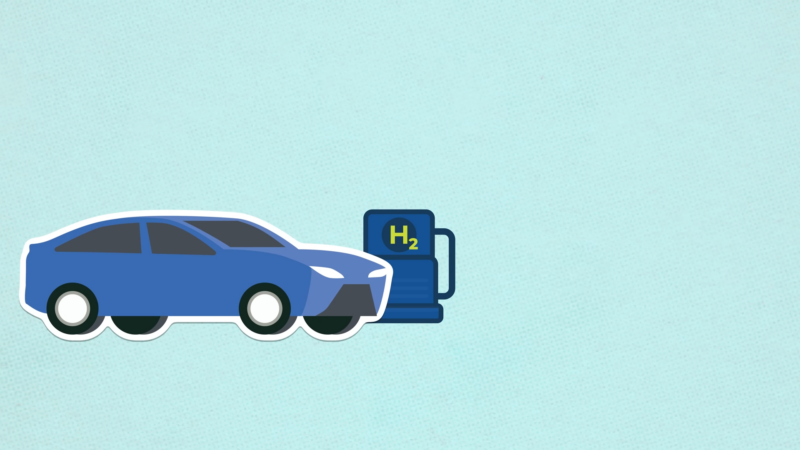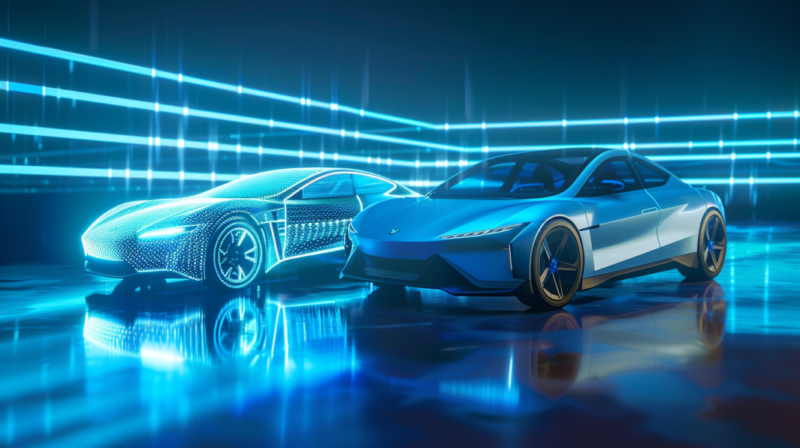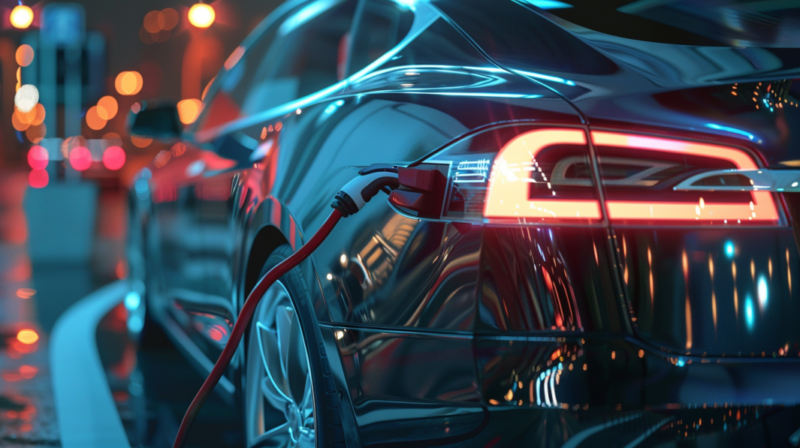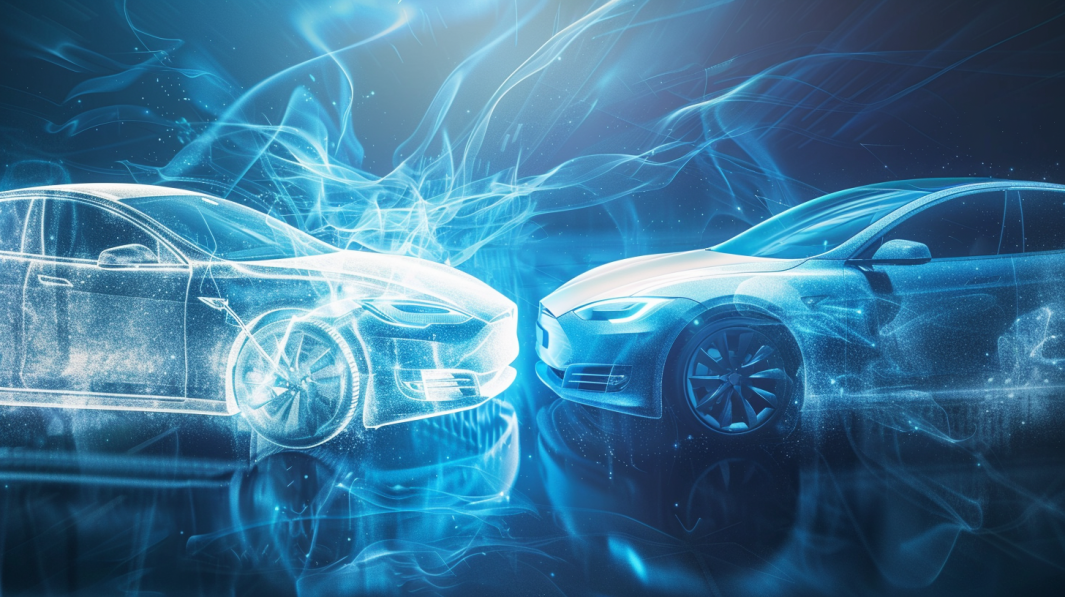The automotive world stands on the brink of a revolution, with hydrogen and electric cars vying for the spotlight in the quest for sustainable mobility. Both technologies promise to lead us away from fossil fuels, but which one offers a brighter future?
In this post, I will walk you through the distinctions, advantages, and challenges of hydrogen and electric vehicles, shedding light on their path toward a cleaner tomorrow.
Key Highlights
- Hydrogen cars offer advantages like faster refueling and longer range, suitable for specific applications like long-haul transport.
- Both hydrogen and electric vehicles play crucial roles in achieving a sustainable transportation future, complementing each other’s limitations.
- Advances in green hydrogen production and supportive government policies are essential for maximizing the environmental benefits of hydrogen cars.
What Powers These Cars?
Hydrogen Variation

At the core of every hydrogen vehicle is a fuel cell. This remarkable technology transforms hydrogen gas into electricity by mixing it with oxygen. The result?
A car that cruises the streets silently, emitting nothing but water vapor. Imagine a car that drinks water and breathes out clouds, running on the most abundant element in the universe.
Electric Variation
Electric vehicles (EVs), on the other hand, draw their power from lithium-ion batteries, similar to the ones found in your handheld gadgets but much larger.
These cars plug into the grid, storing electricity to spin their wheels. With the rise of renewable energy, charging an electric car is becoming greener by the day.
For enthusiasts exploring the future of eco-friendly transportation, SCA Auctions offers a unique perspective by featuring a selection of electric and hybrid vehicles.
This platform allows individuals to bid on a variety of cars, including those powered by the latest green technologies, providing a real-world glimpse into how these vehicles are becoming more accessible and integrated into our daily lives.
Range and Refueling
- Miles on a Single Charge or Fill: Hydrogen cars boast an impressive range of around 400 miles, outpacing most electric cars, which need a recharge after about 200-300 miles.
- Time to Refuel: Here’s where hydrogen has a clear edge. Refilling a tank is a matter of minutes, akin to a traditional gas station visit. Electric cars, meanwhile, require hours to fully charge, even with rapid chargers.
Infrastructure
- Charging Ahead: Electric cars benefit from a growing network of charging stations. Home charging options further enhance their convenience.
- Hurdles for Hydrogen: The scarcity of hydrogen refueling stations is a significant barrier. Building this infrastructure is costly and time-consuming, limiting these cars’ practicality for many drivers.
Costs and Maintenance

- Electric Affordability: Generally, electric cars are cheaper than their hydrogen counterparts, both in terms of upfront cost and running expenses. They also boast lower maintenance needs, thanks to fewer moving parts.
- Hydrogen’s Price Tag: High production costs and the complexity of hydrogen fuel cells translate into steeper prices for hydrogen vehicles.
Environmental Impact
Both hydrogen and electric cars promise a future free from tailpipe emissions. Electric cars have the edge in current infrastructure and affordability, while hydrogen cars offer quick refueling and longer range. Yet, producing hydrogen efficiently and sustainably remains a challenge, tipping the scales in favor of electric vehicles for many.
When considering the environmental impact, the ongoing debate over hybrid versus electric cars adds another layer of complexity to the automotive landscape, as consumers weigh the trade-offs between fuel efficiency and battery-powered sustainability.
Safety and Performance
- Safety Measures: Both vehicle types have undergone extensive testing to ensure safety, addressing concerns like battery fires in EVs and hydrogen leaks.
- Driving Experience: Electric cars are known for their instant torque and smooth acceleration. Hydrogen cars, while offering commendable performance, often focus on efficiency and range.
The Role of Innovation and Policy

Advancements in technology and supportive policies play pivotal roles in shaping the future of hydrogen and electric cars. Governments worldwide are implementing incentives for EV purchases, investing in charging infrastructure and funding research into more efficient and cheaper hydrogen production methods.
These efforts lower barriers to entry, making eco-friendly vehicles more attractive to consumers and businesses alike.
Tailored Solutions for Diverse Needs
The choice between electric and hydrogen cars isn’t binary. Instead, it reflects a broader strategy to meet diverse transportation needs:
- Urban Commuting: Electric cars, with their zero-emission operation and growing charging network, are ideal for daily commutes and city driving.
- Long-Haul Transport: Hydrogen’s fast refueling time and longer range make it suitable for heavy-duty vehicles, such as trucks and buses, ensuring minimal downtime on long journeys.
The Verdict
Given the current landscape, electric cars emerge as the more practical choice for the majority of drivers. Their widespread charging infrastructure, lower costs, and the global push towards electrification give them a significant advantage.
However, hydrogen cars, with their unique benefits, could serve niche markets or complement electric vehicles, especially in heavy transport and areas where rapid refueling is crucial.
FAQs

Can Hydrogen Cars Overtake Electric Vehicles in Popularity?
While these cars have their merits, electric vehicles currently lead the race due to better infrastructure, lower costs, and broader availability. Hydrogen cars might not overtake EVs soon but will play a vital role in diversifying the future of transportation.
Are Electric Cars Truly Zero-Emission?
They produce no emissions during operation. However, the overall environmental impact depends on the electricity source. As renewable energy becomes more prevalent, EVs become even cleaner.
How Long Do Batteries and Fuel Cells Last?
Both technologies have made significant strides in longevity. Electric car batteries can last over 200,000 miles, while hydrogen fuel cells also promise long service lives. Ongoing advancements continue to improve durability and reduce replacement costs.
Can Electric Cars Be Powered by Hydrogen-Generated Electricity?

Yes, electric cars can be powered by electricity generated from hydrogen, especially when using green variation. This approach combines the benefits of both technologies, reducing the carbon footprint of electric vehicle charging.
Do Hydrogen Cars Have Any Noise?
They are nearly as quiet as electric vehicles because they both use electric motors for propulsion. The fuel cell operates silently, making them quiet on the road.
Can Electric and Hydrogen Cars Share the Same Refueling Infrastructure?
No, they require different refueling infrastructures. Electric cars need charging stations to recharge their batteries, while hydrogen cars require hydrogen refueling stations to replenish their fuel cells.
Final Words
The journey towards sustainable transportation is paved with innovation.
Electric and hydrogen cars each offer a vision of a greener, cleaner world. As technology advances and infrastructure expands, the choice between hydrogen and electric might not be an either/or proposition but rather a complementary blend of solutions tailored to different needs and scenarios.
The future is bright—and undoubtedly electric, with a dash of hydrogen for good measure.
Related Posts:
- Hybrid vs Electric Cars: Which Is Better for the…
- Hydro Flask Vs. ThermoFlask: Which is Better? A…
- Why Should I Get an Electric Car - Eco-Friendly Solution
- Sea Level Rise: A Watery Warning for Our Future
- Buildings of The Future Energy Efficiency - Path to…
- Do Not Try To Outrun A Bear - What To Do If You Meet…








